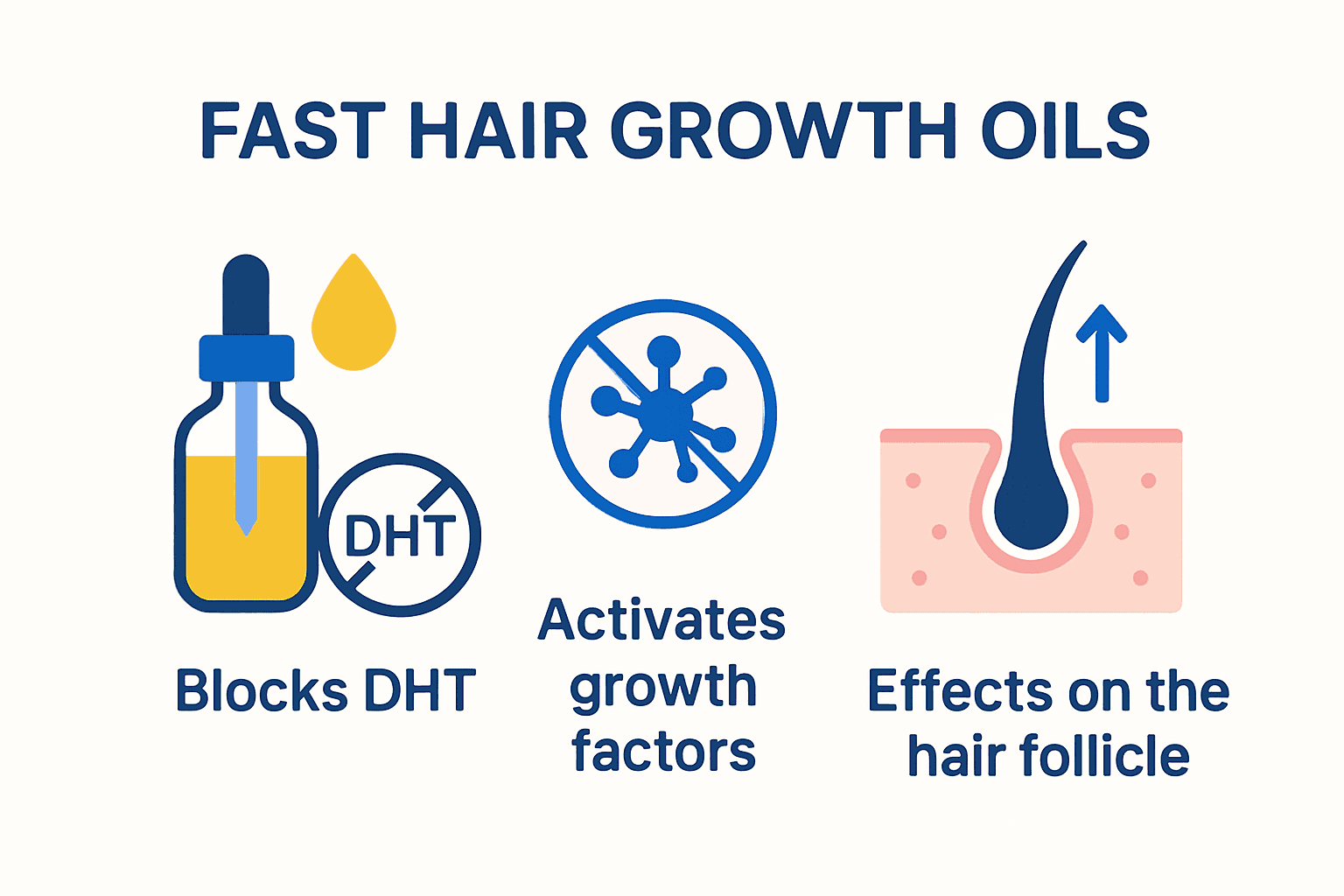Blog
Learning Materials
Fast Hair Growth Oil: Top Picks and Proven Tips for 2025

Tilen
Updated: July 3, 2025

People are always searching for that magic bottle to make their hair grow faster. Turns out, the science is catching up to the hype. One clinical study found that pumpkin seed oil increased hair count by 40 percent in just 24 weeks. But wait. Most people assume fancy oils are the main event. Actually, how you track and personalize your results could be the real gamechanger here.
Table of Contents
- How Fast Hair Growth Oil Works
- Best Fast Hair Growth Oils Reviewed
- Tracking Results And Personalizing Your Routine
- Choosing Safe Oils For Hair Growth Needs
Quick Summary
| Takeaway | Explanation |
|---|---|
| Effective Oils Block DHT | Fast hair growth oils, such as pumpkin seed oil, block dihydrotestosterone (DHT) to prevent hair miniaturization and loss, enhancing hair growth. |
| Rosemary Oil Equals Minoxidil | Clinical studies show that rosemary oil is as effective as 2% minoxidil, providing a natural alternative for promoting hair regrowth. |
| Advanced Tracking Enhances Results | Utilize advanced measurement techniques like digital imaging to track hair density and adjust treatment plans based on individual progress. |
| Consider Safety and Efficacy | Before using hair oils, conduct patch tests and consult professionals to mitigate risks and ensure the selected oils suit your scalp condition. |
| Personalize Your Routine | A comprehensive approach that includes tracking your unique biological factors, such as diet and stress, can optimize hair growth strategies. |
How Fast Hair Growth Oil Works
Understanding how fast hair growth oil functions requires examining its complex biological interactions with hair follicles and scalp health. These specialized oils work through multiple mechanisms to stimulate and support hair regeneration by targeting specific cellular pathways and addressing underlying growth inhibitors.
Biological Mechanisms of Hair Growth Stimulation
Fast hair growth oils operate by modulating critical biological processes that influence hair development. According to research from the National Institutes of Health, these oils can activate several key growth factors including insulin-like growth factor-I (IGF-I), vascular endothelial growth factor (VEGF), and epidermal growth factor (EGF). These molecular signals essentially "communicate" with hair follicle cells, encouraging them to enter active growth phases and extend their natural hair production cycle.
The most effective fast hair growth oils strategically block dihydrotestosterone (DHT), a hormone responsible for hair miniaturization. A clinical study published in the Journal of Cosmetic Dermatology demonstrated that certain herbal extracts can inhibit 5α-reductase, the enzyme converting testosterone to DHT, thereby preserving hair follicle health and preventing premature hair loss.

Penetration and Nutrient Delivery Mechanisms
The efficacy of fast hair growth oils depends significantly on their molecular structure and ability to penetrate hair shafts. Research from the International Journal of Trichology reveals that oils with lower molecular weight can more effectively enter hair structures, delivering essential nutrients directly to follicular roots. Coconut oil, for instance, has a unique linear chain structure enabling deep penetration, which helps reduce protein loss and strengthen hair from within.
Additionally, these specialized oils create an optimal scalp environment by providing antimicrobial protection, reducing inflammation, and improving blood circulation. This holistic approach ensures that hair follicles receive consistent nourishment and support, learn more about personalized hair growth strategies.
The science behind fast hair growth oils is intricate yet promising. By understanding their complex biological interactions, individuals experiencing hair thinning can make informed decisions about incorporating these targeted treatments into their hair care regimen.
Best Fast Hair Growth Oils Reviewed
Selecting the right fast hair growth oil requires understanding the unique properties and scientific evidence supporting different natural and botanical extracts. Not all oils are created equal when it comes to stimulating hair growth and addressing underlying scalp health conditions.
Top Performing Natural Hair Growth Oils
Pumpkin seed oil stands out as a remarkable solution for hair growth. A comprehensive clinical trial published in the Journal of Clinical and Aesthetic Dermatology demonstrated impressive results with male participants experiencing a 40% increase in hair count after 24 weeks of daily supplementation. This significant growth can be attributed to its ability to block 5α-reductase, the enzyme responsible for converting testosterone to DHT, a hormone linked to hair loss.
Rosemary oil presents another compelling option for hair restoration. A single-blind randomized clinical study found that rosemary oil performed equally effectively as 2% minoxidil in promoting hair growth among androgenetic alopecia patients. Over a six-month period, participants using rosemary oil showed significant increases in hair count, making it a potent natural alternative to traditional hair loss treatments. Explore our comprehensive guide on personalized hair growth strategies.
Scientific Validation of Hair Growth Oils

Tea tree oil represents another promising ingredient in the fast hair growth oil landscape. A double-blind, randomized, placebo-controlled study revealed that a microemulsion containing tea tree oil, combined with minoxidil and diclofenac, led to an earlier response in treating androgenetic alopecia compared to minoxidil alone. This research underscores the potential of carefully formulated botanical extracts in accelerating hair regrowth.
Coconut oil continues to be a gold standard in hair care, not just for growth but for overall hair health. Its unique molecular structure allows deep penetration into hair shafts, reducing protein loss and strengthening hair from within. When selecting a fast hair growth oil, look for formulations that combine multiple scientifically validated botanical extracts to maximize potential hair restoration benefits.
The key to successful hair growth lies in understanding individual scalp conditions and selecting oils that address specific hair loss mechanisms. While these oils show promising results, individual responses can vary, and consulting with a hair health professional is always recommended for personalized treatment strategies.
Here is a comparison table summarizing the properties, evidence, and key benefits of the leading hair growth oils mentioned above:
| Oil | Mechanism of Action | Scientific Evidence & Studies | Key Benefits |
|---|---|---|---|
| Pumpkin Seed Oil | Blocks 5α-reductase (DHT) | 40% hair count increase in 24 weeks (JCAD, 2014) | Increases hair count, prevents hair loss |
| Rosemary Oil | Comparable to minoxidil, anti-inflammatory | Equal to 2% minoxidil for hair growth (JCD, 2015) | Natural alternative to minoxidil, fewer scalp irritations |
| Tea Tree Oil | Antimicrobial, anti-inflammatory, supports early regrowth | Faster response with minoxidil vs. minoxidil alone (PMC, 2022) | Early regrowth, supports scalp health |
| Coconut Oil | Deep penetration, protein loss reduction | Reduces protein loss (Trichology, 2015) | Strengthens hair, improves overall hair structure |
Tracking Results and Personalizing Your Routine
Effective hair growth strategies require more than simply applying oils. Successful hair restoration demands a systematic approach to monitoring progress, understanding individual biological responses, and continuously adapting treatment protocols based on precise measurements and personalized insights.
Advanced Measurement Techniques
Researchers developing standardized methods for assessing hair regrowth emphasize the critical importance of accurate tracking techniques. Advanced technologies now enable precise documentation of hair density, shaft diameter, and follicular health. Digital imaging and microscopic analysis allow individuals to quantify subtle changes that traditional visual assessments might overlook.
Molecular monitoring represents a groundbreaking approach to understanding hair growth dynamics. Scientific studies on gene expression tracking reveal that analyzing specific genetic markers can provide early indicators of treatment effectiveness. This approach enables proactive adjustments to hair growth strategies before visible changes occur, transforming reactive hair care into a predictive science.
Personalization Through Comprehensive Analysis
A holistic approach to hair health goes beyond surface-level treatments. Comprehensive research indicates that successful hair restoration requires examining multiple interconnected factors. Nutrition, stress levels, hormonal balance, and genetic predispositions all play significant roles in hair growth potential. Discover personalized hair growth strategies that consider your unique biological profile.
Tracking your hair growth journey involves more than measuring length or density. Consider maintaining a detailed log that includes:
- Monthly photographs under consistent lighting
- Measurements of hair thickness and overall volume
- Notes on diet, stress levels, and lifestyle changes
- Documented responses to specific hair growth interventions
Technology now offers unprecedented insights into personalized hair care. Specialized apps and AI-driven platforms can help analyze your progress, providing data-driven recommendations tailored to your specific hair growth patterns. These tools transform hair restoration from a one-size-fits-all approach to a precisely targeted intervention.
Remember that patience and consistent monitoring are key. Hair growth is a complex biological process that requires time and systematic observation. By adopting a scientific approach to tracking results, you empower yourself to make informed decisions about your hair restoration journey.
Choosing Safe Oils for Hair Growth Needs
Selecting the right hair growth oil requires careful consideration of safety, efficacy, and individual hair health needs. Not all oils are created equal, and understanding their unique properties can help prevent potential adverse reactions while maximizing hair restoration potential.
Scientific Evaluation of Hair Growth Oils
A comprehensive systematic review from 2022 revealed critical insights into popular hair oils. Coconut oil demonstrated effectiveness in treating brittle hair, though scientific evidence for direct hair growth remains limited. Castor oil showed potential for improving hair luster, while argan oil exhibited minimal substantive evidence for hair growth enhancement.
Moreover, a 2023 study evaluating herbal oils identified grape seed oil as the most promising option for hair quality improvement. Researchers found that grape seed oil effectively mitigated damage from regular hair washing, outperforming other seed oils in enhancing overall hair health. Learn more about personalized hair care strategies to optimize your approach.
Below is a summary table of the most discussed hair growth oils, their primary uses, level of scientific support, and specific benefits highlighted in the article:
| Oil | Primary Use | Scientific Support Level | Noted Benefits |
|---|---|---|---|
| Coconut Oil | Treat brittle hair, strengthen hair | Effective for hair strength, limited for growth | Reduces protein loss, strengthens hair |
| Castor Oil | Improve hair luster | Some evidence for shine | Increases hair luster |
| Argan Oil | Hair conditioning | Minimal for growth | Conditions hair |
| Grape Seed Oil | Improve hair quality post-washing | Strong evidence for quality improvement | Reduces washing damage, enhances hair health |
| Rosemary Oil | Support hair regrowth | Comparable to 2% minoxidil | Increases hair count, fewer scalp irritations |
Safety Considerations and Potential Risks
Choosing a safe hair growth oil involves more than selecting a trendy product. Individuals must consider potential allergic reactions, skin sensitivities, and individual biological responses. Some critical safety guidelines include:
- Conducting a patch test before full application
- Checking for potential interactions with existing scalp conditions
- Using pure, cold-pressed oils from reputable sources
- Diluting essential oils with carrier oils to prevent skin irritation
A randomized controlled trial focusing on rosemary oil demonstrated comparable effectiveness to 2% minoxidil in increasing hair count, with the significant advantage of fewer reported scalp irritations. This research underscores the importance of selecting oils that not only promote growth but also maintain scalp health.
It is crucial to recognize that individual responses to hair growth oils can vary dramatically. Factors such as genetics, overall health, nutritional status, and existing scalp conditions play significant roles in determining treatment effectiveness. Consulting with a healthcare professional or trichology specialist can provide personalized guidance tailored to your specific hair restoration needs.
Ultimately, safe and effective hair growth requires a holistic approach. While oils can support hair health, they should be part of a comprehensive strategy that includes proper nutrition, stress management, and appropriate hair care practices. Patience, consistent application, and realistic expectations are key to achieving meaningful hair growth results.
Frequently Asked Questions
What are the best oils for fast hair growth?
The best oils for fast hair growth include pumpkin seed oil, rosemary oil, tea tree oil, and coconut oil. These oils have been scientifically validated for their effectiveness in promoting hair growth and improving overall scalp health.
How does pumpkin seed oil help with hair growth?
Pumpkin seed oil helps with hair growth by blocking dihydrotestosterone (DHT), a hormone linked to hair miniaturization and loss. Clinical studies have shown that it can increase hair count by up to 40% in just 24 weeks.
Is rosemary oil as effective as minoxidil for hair growth?
Yes, clinical studies have demonstrated that rosemary oil is as effective as 2% minoxidil for promoting hair growth, making it a natural alternative for those seeking to address hair thinning or loss.
What should I consider when choosing a hair growth oil?
When choosing a hair growth oil, consider its effectiveness, safety, your specific scalp condition, and potential allergic reactions. Always perform a patch test and consult with a professional for personalized recommendations.
Take Control of Your Hair Growth Journey with AI-Powered Insights
Finding the right hair growth oil is just one part of the equation. The real challenge lies in tracking your progress and personalizing your approach. If you are tired of guessing which oil truly works for your hair type or wondering if you are seeing real results, you are not alone. Many people struggle to connect the science behind fast hair growth oils to their unique hair patterns. Frustration builds when products do not deliver on their promises or when progress is slow and hard to measure.

Instead of hoping for a miracle, discover the power of personalized tracking and tailored recommendations. At MyHair.ai, you can leverage AI-driven technology to analyze your scalp, monitor real change, and receive custom advice on the best products and routines for your needs. Trust science, not guesswork. Start your transformation now by uploading a scan or exploring how AI can unlock your thickest, healthiest hair. See the difference data makes and build a routine that actually works for you. Visit MyHair.ai today and take the first step toward real hair growth progress.